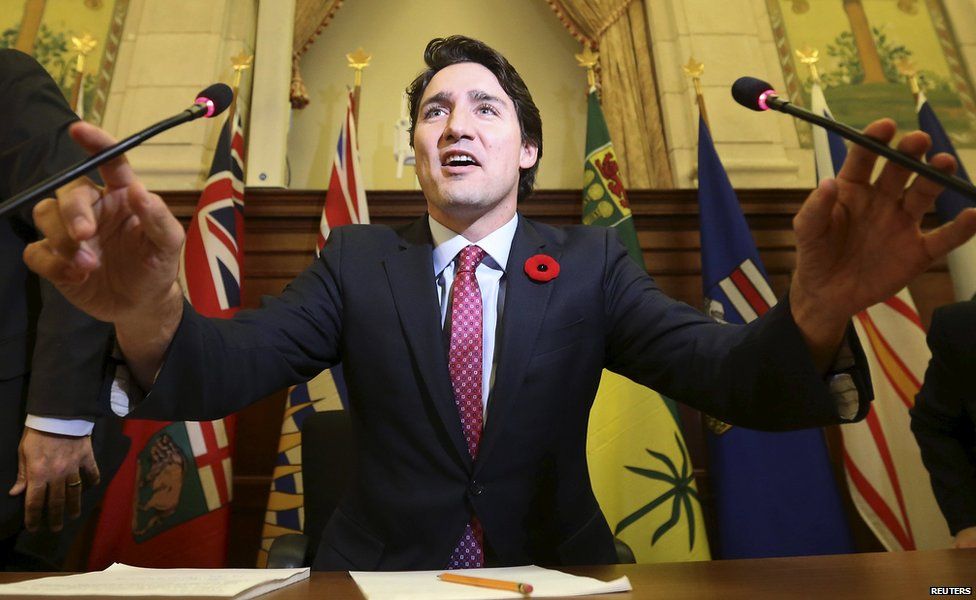Justin Trudeau takes Canada by the horns as Prime Minister
- Published

Justin Trudeau is Canada's 23rd prime minister
He campaigned on change. And within two days of being sworn in as Canada's prime minister, Justin Trudeau altered the course of the country.
"Over the course of the campaign, we promised you a government that will bring real change - in both the things we do and the way we do them," he wrote in an open letter, external to Canadians.
With a team of new ministers, Mr Trudeau acted swiftly.
More open and accountable
The new prime minister and his cabinet make themselves available to the press and the public.
"Hours after capturing a stunning majority government - the Liberal leader hightailed to Ottawa to take questions from journalists at the National Press Gallery Theatre," wrote The Huffington Post, external. "The symbolism was not lost. Harper used the space just seven times during his tenure and hasn't been seen there since 2009."
Following their very first cabinet meeting after the prime minister's swearing in, ministers met the media. The Huffington Post, external pointed to the fact that under Mr Harper, reporters were banned from waiting outside the cabinet room, where they had previously interviewed ministers for decades.
For the first time in Canadian history, equal numbers of men and women are cabinet ministers
Gender-balanced cabinet
After his swearing-in on 4 November, Mr Trudeau introduced his new cabinet which include 15 women and 15 men.
When a member of the press asked why he felt it was important to include so many women, he said, "Because it's 2015."
He described the full cabinet as "looking like Canada", including First Nations, minorities and a former refugee. The minister of transport is former astronaut Marc Garneau.
Other ministers include a physician, a UN peacekeeper, a paralympian, a geoscientist and a lieutenant-colonel in the Canadian Forces.
Justin Trudeau is Canada's second youngest prime minister
Unmuzzling Canadian scientists and diplomats
Under the former government, scientists were limited by who they could talk to and what they could say. Many called it "muzzling" scientists.
"Scientists complained that the government message control was extreme," Charles Mandel writes in The National Observer, external. He goes on to relay an incident in which a reporter's question about algae resulted in 110 pages of emails between 16 different federal government communications operatives to come to an 'approved' answer."
Within Mr Trudeau's first week, staff at an oceanography institute run by the federal department of fisheries were told they could speak openly to the media.
As of 6 November, Alain Vezina of the Bedford Institute of Oceanography told his staff, "If you're contacted directly by the media, let's say you're at a conference or a workshop, the media is there. You can talk directly. You don't have to say, 'I don't have permission to speak.'"
In the same way, Mr Trudeau told his Canadian diplomats abroad that their judgement and insight is welcome "to advance Canada's foreign policy goals," as opposed to "the strict message control that the Harper Conservative government imposed," writes The Globe and Mail, external.
Long-form census
The Liberals announced they would reinstate the mandatory, long-form census, which was abolished by the Conservative government of Mr Harper in 2010.
The census provides data for government, businesses, not-for-profits and academics. It is used for allocating funds for infrastructure and social programmes. The information is aggregated, but the Conservative government argued the census invaded the privacy of individuals.
After the Liberal government announced the long-form census would be back, the National Post newspaper (which endorsed Mr Harper in the last election) posted, external, "This was, more than anything, a symbolic break from the worst excesses of former prime minister Stephen Harper's government: very few examples better demonstrated the Tories' occasional boneheaded instincts than the case of the census."
Welcoming refugees
During the run-up to the election, candidates argued over the question of resettling Syrian refugees.
Mr Trudeau pledged to resettle 25,000 Syrian refugees by the end of 2015 (more than double the number presented by the former government).
To emphasise that commitment, during his first week in office, the prime minister changed the name of the citizenship and immigration department to "Immigration, Refugees and Citizenship Canada".
Sophie Gregoire-Trudeau and Prime Minister Justin Trudeau sit with Laureen Harper and then Prime Minister Stephen Harper
- Published4 November 2015
- Published20 September 2021
- Published20 October 2015